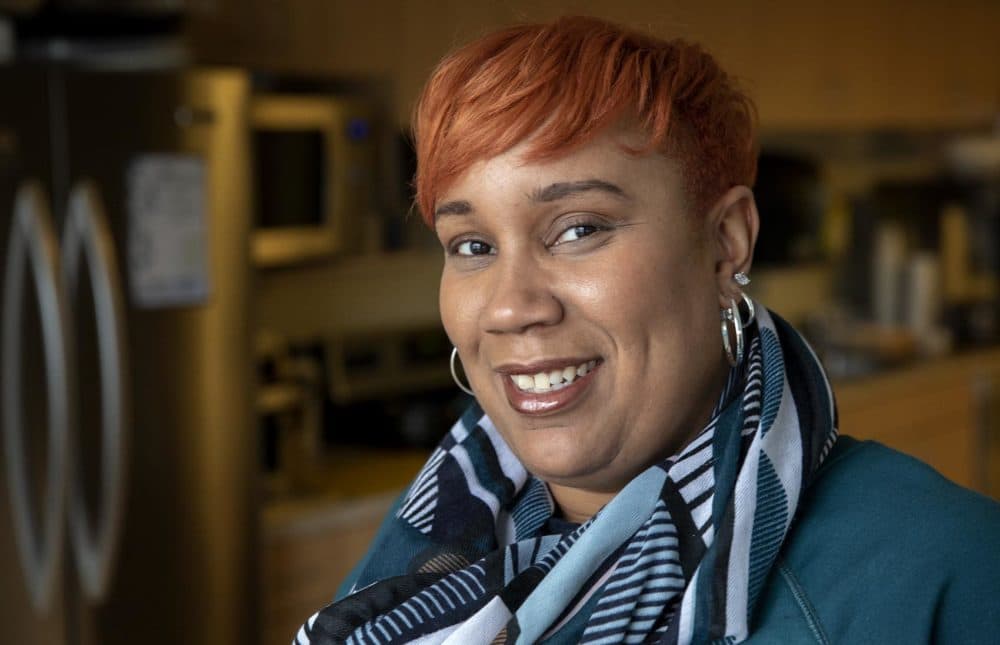Advertisement
'It's A Life's Work': Elle Simone Wants To Uplift Women Of Color In The Food Industry
Resume
Elle Simone calls herself the "culinary Oprah." As a woman of color in the male-dominated food industry, Simone has made her mark as a food stylist, chef and now as a TV host on PBS' "America's Test Kitchen," watched by 10 million viewers a month.
A Detroit native, Simone spent seven years as a social worker before breaking barriers in food. She's also an ovarian cancer survivor. After that battle, Simone made it a personal mission to try to guide and mentor women attempting to break into the culinary world, founding the for-profit networking organization SheChef in 2013.
While her success has helped inspire other women, Simone (@ChefElleSimone) says she's also had to overcome criticism.
"There are some people who are very excited to see not just a woman of color, but also just to see ['America's Test Kitchen'] moving in the direction of being more diverse," she says. "There are some people who are like, 'You're a token black,' you know? There are people who feel some kind of way about it.
"I never felt that way. I personally don't feel that any movement that I make that advances women, women of color, people of color — I feel like that's a privilege. It's not something to fill a quota. It's a life's work."
Interview Highlights
On her transition to working as a TV host
"I certainly did not see myself in television in front of the camera. I've always worked behind the camera. I always enjoy producing shows and creating content for people, so one would think that it was a natural transition, but it actually was ... very difficult."
"At first, I never saw anyone who looked like me on any cooking show."
Elle Simone
On bringing something to "America's Test Kitchen" that was missing
"I definitely feel like diversity is a very important movement, not just in the industry right now, but just in terms of representation. People want their organizations to represent the world, their viewers, and I feel that 'America's Test Kitchen' was no different. They cook a lot of amazing foods, they talk about a lot of you know wonderful regions in this country, and I think that they were just very interested in having their brand actually represent this country."
On not thinking of cooking as a serious career path early on
"At first, I never saw anyone who looked like me on any cooking show. I grew up in the Emeril [Lagasse] era, so first, there were probably only men at that time — I didn't come to know about Julia Child until I was older. But I never saw anyone who looked like me, so I didn't think that that was a reality. And then, my family always encouraged me to go into a more practical career path. And so I chose social work. I'm a sociologist, I love everything about people. So it was a natural fit."
On the genesis of her organization SheChef, and its aims
"SheChef is a professional networking organization for women chefs of color and our allies. It was born from the experiences that I had working in the culinary industry in New York City, going in various kitchens and finding myself to either be one of few women, sometimes the only woman — definitely one of few women of color, if not the only woman of color. I was sure that there were other women who were having the same experience, because I went to culinary school with lots of women of color, but I never saw them in the workplace.
"After doing a lot of market research, I found all the varying reasons that women were either not staying in the industry or were finding themselves unfulfilled. And some of those reasons were, like, the rate of pay. Most women of color are carrying their family on their back — you can't do that with $12 an hour.
"It's difficult when you don't have a support system, and a lot of those women were the support system for the family."
On tips and tricks people can use in their own kitchens
"I think I've learned a lot of ways to just be more efficient in the kitchen: treating your home kitchen like you treat your restaurant kitchen and how you store things in your refrigerator. You want to put meat and seafoods at the bottom, you want to put your produce in the proper drawers, because they're the proper temperature and just making sure you keep your fruits and vegetables up top so they don't get contaminated.
"Also, it seems like such a little thing, but a sharp knife keeps you from cutting yourself because it will go straight through the food — it won't wobble and hit your finger. And we also have some great videos about knife sharpening and knife care.
"Just checking expiration dates — a lot of people don't think that dry spices have expiration dates, but they do. You should not keep your dried spices more than 90 days. That's a stretch. So I always encourage people, just get small, tiny."
Karyn Miller-Medzon produced and edited this interview for broadcast. Jack Mitchell adapted it for the web.
This segment aired on January 14, 2019.

